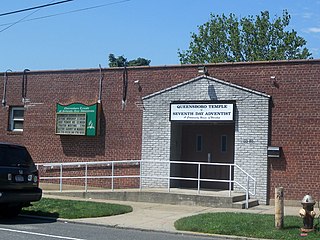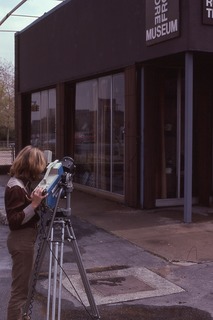
St. Albans is a residential neighborhood in the southeastern portion of the New York City borough of Queens. It is bordered by Jamaica to the northwest, Hollis to the north, Queens Village to the northeast, Cambria Heights to the east, Laurelton to the southeast, Springfield Gardens to the south, and South Jamaica to the southwest. St. Albans is centered on the intersection of Linden Boulevard and Farmers Boulevard, about two miles north of John F. Kennedy International Airport.

Yusef Komunyakaa is an American poet who teaches at New York University and is a member of the Fellowship of Southern Writers. Komunyakaa is a recipient of the 1994 Kingsley Tufts Poetry Award, for Neon Vernacular and the 1994 Pulitzer Prize for Poetry. He also received the Ruth Lilly Poetry Prize. Komunyakaa received the 2007 Louisiana Writer Award for his enduring contribution to poetry.

Jamaica is a neighborhood in the New York City borough of Queens. It is mainly composed of a large commercial and retail area, though part of the neighborhood is also residential. Jamaica is bordered by Hollis to the east; St. Albans, Springfield Gardens, Rochdale Village to the southeast; South Jamaica to the south; Richmond Hill and South Ozone Park to the west; Briarwood to the northwest; and Kew Gardens Hills, Jamaica Hills, and Jamaica Estates to the north.

Hollis is a residential middle-class neighborhood within the southeastern section of the New York City borough of Queens. While a predominantly African-American community, there are small minorities of Hispanics and South Asians residing in the area. Boundaries are considered to be 181st Street to the west, Hillside Avenue to the north, Francis Lewis Boulevard to the east, and Murdock Avenue to the south. Hollis is located between Jamaica to the west and Queens Village to the east.

The Black Arts Movement (BAM) was an African American-led art movement that was active during the 1960s and 1970s. Through activism and art, BAM created new cultural institutions and conveyed a message of black pride.

Woodhaven is a neighborhood in the southwestern section of the New York City borough of Queens. It is bordered on the north by Park Lane South and Forest Park, on the east by Richmond Hill, on the south by Ozone Park and Atlantic Avenue, and the west by the Cypress Hills neighborhood of Brooklyn.

South Jamaica is a residential neighborhood in the borough of Queens in New York City, located south of downtown Jamaica. Although a proper border has not been established, the neighborhood is a subsection of greater Jamaica bounded by the Long Island Rail Road Main Line tracks, Jamaica Avenue, or Liberty Avenue to the north; the Van Wyck Expressway on the west; Rockaway Boulevard on the south; and Merrick Boulevard on the east, adjoining the neighboring community of St. Albans. Other primary thoroughfares of South Jamaica include Baisley, Foch, Linden, Guy R. Brewer, and Sutphin Boulevards. The 180th Street Business Improvement District is responsible for the development of the area.

Barry Doyle Harris was an American jazz pianist, bandleader, composer, arranger, and educator. He was an exponent of the bebop style.

The Nuyorican Poets Cafe is a nonprofit organization in Alphabet City, on the Lower East Side of Manhattan. It is a bastion of the Nuyorican art movement in New York City, and has become a forum for poetry, music, hip hop, video, visual arts, comedy, and theater. Several events during the PEN World Voices festival are hosted at the cafe.

The Madam C. J. Walker Building, which houses the Madam Walker Legacy Center, was built in 1927 in the city of Indianapolis, in the U.S. state of Indiana, and as Madam C. J. Walker Manufacturing Company, it was designated a National Historic Landmark in 1991. The four-story, multi-purpose Walker Building was named in honor of Madam C. J. Walker, the African American hair care and beauty products entrepreneur who founded the Madam C. J. Walker Manufacturing Company, and designed by the Indianapolis architectural firm of Rubush & Hunter. The building served as the world headquarters for Walker's company, as well as entertainment, business, and commercial hub along Indiana Avenue for the city's African American community from the 1920s to the 1950s. The historic gathering place and venue for community events and arts and cultural programs were saved from demolition in the 1970s. The restored building, which includes African, Egyptian, and Moorish designs, is one of the few remaining African-Art Deco buildings in the United States. The Walker Building was added to the National Register of Historic Places in 1980.
Queens Teens Voices is a local quarterly newspaper geared toward the youth in New York City and particularly in south-eastern Queens. It has operated under the Afrikan Poetry Theatre since 2000. The newspaper covers a multitude of topics from entertainment, sports, health, poetry and politics to other points of interest in the lives of adolescents. The editor-in-chief is Kubballa Waliyaya, brother of the co-founder of the Afrikan Poetry Theatre, Yusef Waliyaya.

Culture in North Omaha, Nebraska, the north end of Omaha, is defined by socioeconomic, racial, ethnic and political diversity among its residents. The neighborhood's culture is largely influenced by its predominantly African American community.

Chopin Theatre Productions is a 501(c)(3) not for profit art presenter and producer at the historic Chopin Theater building in Chicago. Built in 1918, in what is now Wicker Park, the theater is located across the Polish Triangle. Chopin Theatre's 500+ annual theater, literary, music, film and social events are often avant-garde or international. Its mission is to promote enlightened civic discourse through a diverse range of artistic offerings.
The Providence Black Repertory Company was a 501c3 non profit arts organization based in Providence, Rhode Island, USA. It offered programming inspired by the cultural traditions of the African Diaspora in Theater, Education, and Public Programs. It operated from 1996 till 2009.

The Store Front Museum was a community museum in Queens, New York that served as a cultural center and exhibition space for the black community of the borough. Established in 1971 by artist Tom Lloyd, it was originally located on Liberty Avenue, in a former retail tire dealer building.
New Heritage Theatre Group (NHTG) is the oldest Black nonprofit theater company in New York City, established in 1964. Through its multiple divisions: IMPACT Repertory Theatre, The Roger Furman Reading Series, and New Heritage Films, New Heritage gives training, exposure, and experience to new and emerging artists, playwrights, directors and technicians of color. New Heritage was founded by the late Roger Furman and is currently headed by Executive Producer Voza Rivers and Executive Artistic Director Jamal Joseph. NHTG presentations capture the historical, social, and political experiences of Black and Latino descendants in America and abroad.
Keith Waithe is a Guyana-born musician, composer and teacher who has been based in the United Kingdom since 1977. He is best known as a flautist and founder of the Macusi Players – a world music jazz band whose name derives from the indigenous Guyanese Macushi people – and has been "acknowledged as the best flute player that Guyana has ever produced". His musical style explores a fusion of jazz, classical, African, Caribbean, Asian and Western influences, and he has also developed a technique he calls "vocal gymnastics", in which he uses the voice to reproduce percussive sounds. Music critic Kevin Le Gendre notes that Waithe "has single-mindedly pursued his own artistic agenda, developing a songbook that draws heavily on African-Caribbean and Asian folk traditions as well as jazz ingenuity in a manner not dissimilar to a large number of his forebears, of which Yusef Lateef is perhaps the most direct reference."
George Edward Tait was an American poet, writer, educator, storyteller, journalist, activist, historian, public speaker, tutor, bandleader, musician, and performer. He was known as the Poet Laureate of Harlem, and a part of the Black Arts Movement. He was the author of At Arms and The Baker's Dozen: Selected Dance Poems. He spearheaded a musical poetry group called Black Massical Music from 1972 to 1977. He founded The Society of Afrikan Poets. His definition of music is the poetry of sound. He died on November 5, 2017. Tait has been writing and teaching for over thirty five years, and known for having poetry readings and workshops. He taught at writing at universities, juvenile detention centers, senior centers, community centers, libraries and theaters. He is the author of the Black Brigade. George Edward Tait was secretary of the Afrikan Nationalist Pioneer Movement which was founded by Carlos A. Cooks.
The East was a community education and arts organization in Brooklyn, New York City focused on black nationalism, which was founded in 1969.












